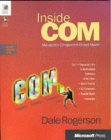Olivier Langlois's blog
Category: Windows programming
06/15/07
Essential COM
I have learned a lot with this book. I would not qualify the book an introduction book because unless you have some background knowledge and practice, you are going to find the last chapters hard to digest. What the book does is to covers the essential principles of COM with great details. This will make the first reading very interesting and it will make you come back from time to time to seek back specific detail.
Inside COM
This book is probably the best COM introduction book for C++ programmers. It walks you through the basics such as the IUnknown and the IDispatch interfaces, the different types of COM servers and the threading models. Everything is explained in clear writing style.
06/13/07
ADO : Activex Data Objects
I have also read Programming ADO from David Sceppa and I prefer this one because it contains a lot examples with source code. My only complain is that there is only a small C++ program and the rest are all in Visual Basic. However, this is not a big issue as it is very easy to port the samples in C++.
06/02/07
Windows++
This is a very old book dating from Windows 3.1 era. It walks you through the methodology one could take to encapsulate the Windows API in a C++ framework. Most of the information contained in the book is still accurate today except for one chapter related to memory management.
Windows 2000 Graphics API Black Book
This book covers in details the GDI API and the DirectDraw API. Even if it was written for Windows 2000, it is safe to assume that these APIs have not changed much in Windows XP. The source code samples contain mistakes but it remains an excellent reference. I recommend this out of print book because you can probably get it for a very cheap price.
Olivier Langlois's blog
I want you to find in this blog informations about C++ programming that I had a hard time to find in the first place on the web.
| Sun | Mon | Tue | Wed | Thu | Fri | Sat |
|---|---|---|---|---|---|---|
| << < | > >> | |||||
| 1 | 2 | 3 | 4 | 5 | 6 | 7 |
| 8 | 9 | 10 | 11 | 12 | 13 | 14 |
| 15 | 16 | 17 | 18 | 19 | 20 | 21 |
| 22 | 23 | 24 | 25 | 26 | 27 | 28 |
| 29 | 30 | |||||
Search

Categories
Olivier Langlois's blog
- AAC (2)
- Book reviews (12)
- C++ (24)
- Code Optimization (4)
- Compiler (3)
- Fractal (2)
- Linux/UNIX (3)
- Multithreading (3)
- Software security (7)
- TCP/IP (8)
- Web (1)
- Windows programming (19)
- C++ (28)
- tutorials (4)
- General (10)
- Hardware reviews (2)
- Linux (12)
- Recommended books (4)
- C++ (20)
- Code Optimization (2)
- Compiler (3)
- Fractal (2)
- Linux/UNIX (1)
- Multithreading (2)
- Rare out of print (3)
- Software security (5)
- TCP/IP (7)
- Windows programming (16)
- Software reviews (0)
- TCP/IP (8)
- Video games (4)
Archives
- January 2016 (1)
- September 2015 (1)
- July 2015 (1)
- June 2015 (1)
- May 2015 (1)
- December 2013 (3)
- September 2013 (1)
- May 2013 (8)
- April 2013 (1)
- December 2010 (1)
- August 2010 (1)
- June 2010 (1)
- More...
Misc
 XML Feeds
XML Feeds
What is RSS?
Who's Online?
- Guest Users: 2
 BOOKS i'm reading
BOOKS i'm reading








